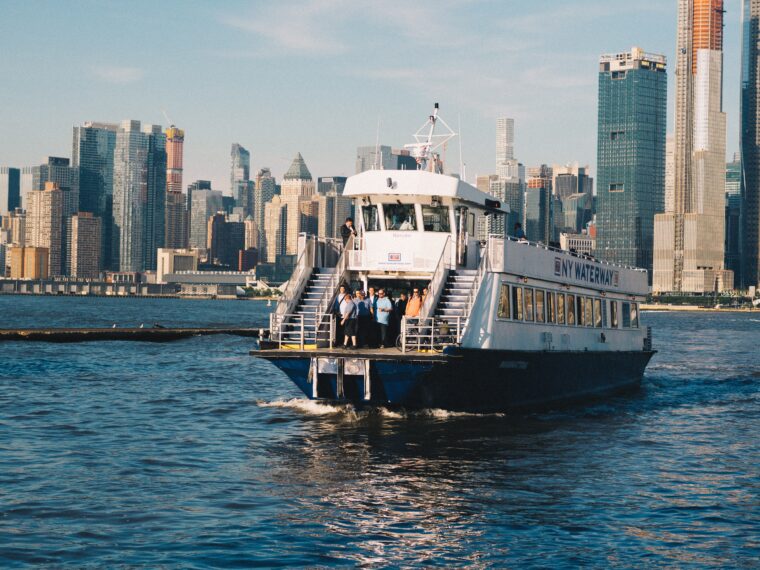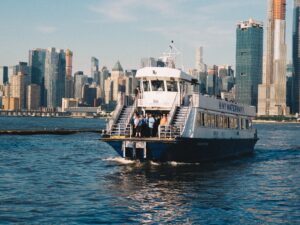
In November, the Federal Transit Administration (FTA) announced another $220 million in grant funding for upcoming ferry projects. The awards will support 13 projects in eight states and American Samoa, an unincorporated territory of the U.S. This funding was allocated through the Bipartisan Infrastructure Bill passed by Congress. The total allocation made available is approximately $2.3 billion for ferries. Projects such as the ones described are currently in the planning stages.
Alaska’s Department of Transportation will construct the infrastructure for a new hybrid-electric ferry along the Alaska Marine Highway System. This $49 initiative is outlined in the state’s transportation plan and is a part of the state’s commitment to ensure sustainability and reduce emissions.
Photo by Maxwell Ridgeway on Unsplash
The new battery-electric powered ferry will replace an aging vessel, increasing travel efficiency and reducing operating hours and maintenance costs. It will also shuttle passengers and vehicles between rural communities. The project’s design phase will be finalized in early 2024 and awards to contractors for the construction of the ferry and supporting infrastructure will be made in 2024. Officials say the new ferry shuttle should be operational by late 2025.
At a cost of $40 million, the Michigan Department of Transportation will procure a new vessel for the Beaver Island Ferry System and renovate the existing dock. The ferry system is critical for transporting approximately 40,000 passengers, 6,500 vehicles and 10,000 tons of freight annually over 32 miles of waterway between Charlevoix and Beaver Island. It is also an essential component of the local economy, and one of the two functioning boats is over 60 years old and must be replaced. Additionally, rising water levels have permanently damaged the island’s dock and must be repaired.
The new ferry will be designed to operate on environmentally friendly power sources. A propulsion study will be finalized in February 2024, and it will prompt an immediate survey of the dock infrastructure needed to accommodate the new vessel. Construction is slated to begin late in 2024. Both the FTA and the state are providing the project’s funding.
Maine’s Department of Transportation will upgrade and modernize two aging ferry terminals in Penobscot Bay – Lincolnville and Islesboro. The $22 million project received federal transportation funding and is slated to go out to bid in 2024 when the design phase is completed.
The two terminals, built in 1959, will be modified and enhanced to support a new hybrid electric ferry. The current ferry, powered by diesel, will be replaced by one that operates on battery-powered propulsion. The project will also include charging infrastructure on both sides of the bay. Other project components will deliver larger berthing spaces, a new vertical mooring structure to secure ferries in place, and new gangways. The ferry transports residents of Islesboro to the mainland and carries more than 80,000 vehicles and 180,000 passengers to and from Islesboro annually.
City leaders in Berkeley, California, will rebuild the Berkeley Pier and add ferry access to the San Francisco Bay in 2024. The project’s cost has been estimated to range between $20 million and $55 million.
The pier closed in 2015 because of corroded rebar from salt water, which degraded the concrete, and this project will include the construction of a new dual-purpose pier in the same location. It will be designed to enhance ferry and foot traffic, accommodate emergency and maintenance vehicles and provide space for recreational activities. The existing 320-car parking lot will be renovated with new pavement surfacing, striping, and stormwater bioswales to treat stormwater.
The Department of Transportation in Alaska will expand and improve a ferry terminal for the Alaska Marine Highway System for $13 million. The existing Pelican ferry terminal is not large enough to accommodate the newer and larger vessels and needs modernization.
The Pelican terminal project is currently in the design phase, concluding in 2024. The project’s right of way will then be secured to begin construction. The project received funding from the Federal Transit Administration’s Rural Ferry Program Award.
New York City received federal funding to create infrastructure to support the electrification of the hybrid-electric Governs Island Ferry, which provides service between Lower Manhattan and Governors Island. The project will be designed to construct a rapid charging station on the shore that will quickly provide power to the new vessel. The electric ferry charging station will be constructed at Soissons Ferry Landing on Governors Island and officials have said the project should be completed in 2025.
The new ferry’s battery propulsion will create zero emissions, but it will retain a diesel engine, which will be used with electric power. About 1 million people visit Governors Island each year.
In addition to the Governors Island Ferry, the Staten Island Ferry in New York was upgraded after receiving additional federal funding support. The funding will be used to secure office space for around-the-clock operations of the ferry system.
These, and similar projects, will require private sector services of all types in 2024.

